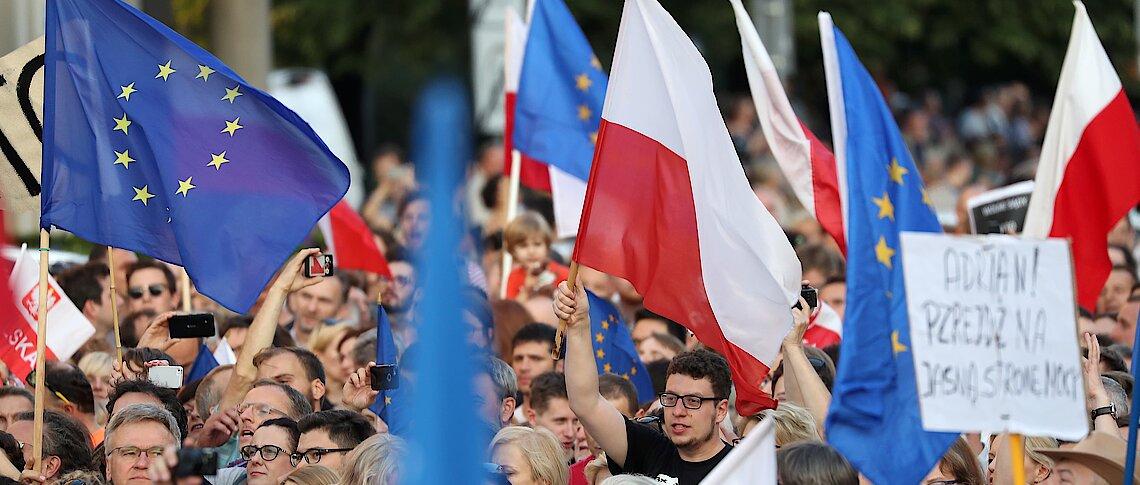Read this article in German.
Having achieved a two-thirds majority once again in Hungary’s recent parliamentary elections, Viktor Orbán can be expected to use his power to make further far-reaching domestic policy changes to his benefit. Deliberately timed for after the election, the European Parliament Committee on Civil Liberties, Justice and Home Affairs (LIBE) published a report calling for sanctions to be initiated against Hungary in accordance with Article 7 of the Treaty on European Union for failing to uphold the EU’s core values. Long described hyperbolically as the 'nuclear option', Article 7 can ultimately lead to the withdrawal of a member state’s voting rights – at least theoretically.
For the first time in EU history, Article 7 proceedings are currently in progress against Poland’s controversial judicial reforms, but the ruling 'Law and Justice' (PiS) party and its government are unlikely to have anything to fear in this respect: Hungary has made it clear from the start that it will not vote against Poland, making it impossible to achieve the required unanimity. There are currently no signs that Poland intends to back down ahead of the decisive vote in the European Council, although there is talk of 'initial progress' in Brussels. When even the 'nuclear option' is ineffective, then, what options are available to the EU as it seeks to protect the core values on which the Community is built? Quite a lot, as it happens. But this requires the EU to go further than it has to date.
The EU budget: a powerful tool
On 2 May 2018, the European Commission has issued its proposal for the next Multiannual Financial Framework. It recommends that EU funding be tied to compliance with rule of law criteria. This would be a step in the right direction. However, the EU should also consider extending these political conditions to its other subsidy and funding programs, as it could otherwise risk giving the impression that the net recipients of EU structural funds – primarily the eastern member states – are being singled out.
The Commission needs to be the driving force and take member states to court – not only in matters of EU law, but also when it comes to systemic infringements of the Treaty that concern the legal system of the EU itself.
As the debate on the next Multiannual Financial Framework continues, non-governmental organisations are also calling for a fund to promote civil society. On 19 April 2018, the European Parliament passed a corresponding resolution with a large majority. Now the ball is in the court of the member states. But the EU has even more options at its disposal when it comes to upholding its core values.
Instead of Article 7, which comes with high political hurdles, the European Commission should make greater use of legal remedies. A ruling by the European Court of Justice (ECJ) in late February showed the way. At its heart, it involved the question of whether judicial independence in Portugal would be compromised if judges’ salaries were temporarily reduced. However, the ECJ took the opportunity to set out some basic principles: Judicial independence in the EU member states is a precondition for a functional European system of judicial cooperation and mutual trust in national jurisdictions. Contrary to the pronouncements by the governments concerned, this means issues like these are more than just purely national matters, and judicial reforms like those in Poland could be the subject of an infringement procedure. However, this would require the European Commission to initiate such a procedure. It needs to be the driving force and take member states to court – not only in matters of EU law, such as the cases of competition law that have been prosecuted previously, but also when it comes to systemic infringements of the Treaty that concern the legal system of the EU itself.
Is a fair trial in Poland possible?
The fact that the Polish reforms are already having an impact on judicial cooperation in the EU was illustrated in a ruling by the Irish High Court in March that created a stir throughout Europe. As a matter of principle, a European arrest warrant provides for extradition to another EU member state without the need to examine whether the accused can expect a fair trial, as is the case for third countries. In this case, however, the Irish court refused to extradite a Polish national to his homeland, citing the lack of guaranteed judicial independence in the country. Instead, it requested an ECJ ruling that is expected in the next few weeks. If the ECJ comes to the conclusion that the Polish judiciary is indeed no longer independent, extraditions to Poland would no longer be possible, and judicial cooperation between Poland and the rest of the EU would be impaired.
Almost everyone agrees that the EU is in need of democratic reform. But the EU can be democratic only if its member states are too.
But the EU institutions are not the only ones who need to do their homework. The European party political groupings must also to be encouraged to take responsibility. Their statutes explicitly refer to values like democracy and the rule of law. In practice, however, political majorities in the European Parliament appear to be more important than principles. In the interests of credibility, the parties need to take their values seriously and make use of and enhance the opportunities available to them. Although expulsions from party groupings would naturally be a last resort, since this would also mean losing any possibility of exercising a positive influence, sanction procedures would be made easier if they were formalised. To date, there are still no clear criteria and no institutions, such as internal courts of arbitration. The party groupings could also appoint rapporteurs to regularly monitor the core values, in the same way as is being demanded with a view to the EU member states. Publishing the results could help to exert pressure both within the party and publicly.
EU needs democratic reform
However, the problem remains that the European parties are not as advanced as their national counterparts. In particular, they can perform the traditional recruitment function of political staff only to a limited extent, as the European Parliament is elected via national lists. This means the European parties are lacking an important piece of leverage. The introduction of transnational lists would increase their influence over the member parties, as they would then be able to nominate candidates for the European Parliament and punish problematic members in the process.
All of which leads us to the big picture: the debate concerning reform in the European Union. Transnational lists are just one of the many proposals for making the European Union more democratic. Almost everyone agrees that the EU is in need of democratic reform. But the EU can be democratic only if its member states are too. As such, ensuring democracy in the EU member states must be an element of the current debates on the fundamental principles of the Union. It should be noted that Poland and Hungary are merely illustrative examples; they are neither the first nor the only 'problem cases' in the EU. Populist parties are on the rise throughout Europe and posing a challenge to liberal democracy. As such, the opportunities currently presenting themselves must be used to safeguard European values. The scope for action will not become bigger.






